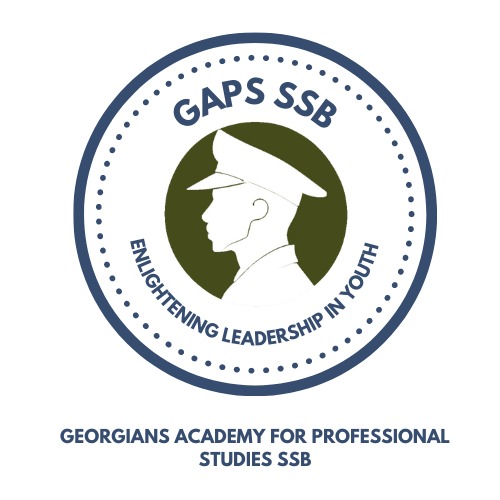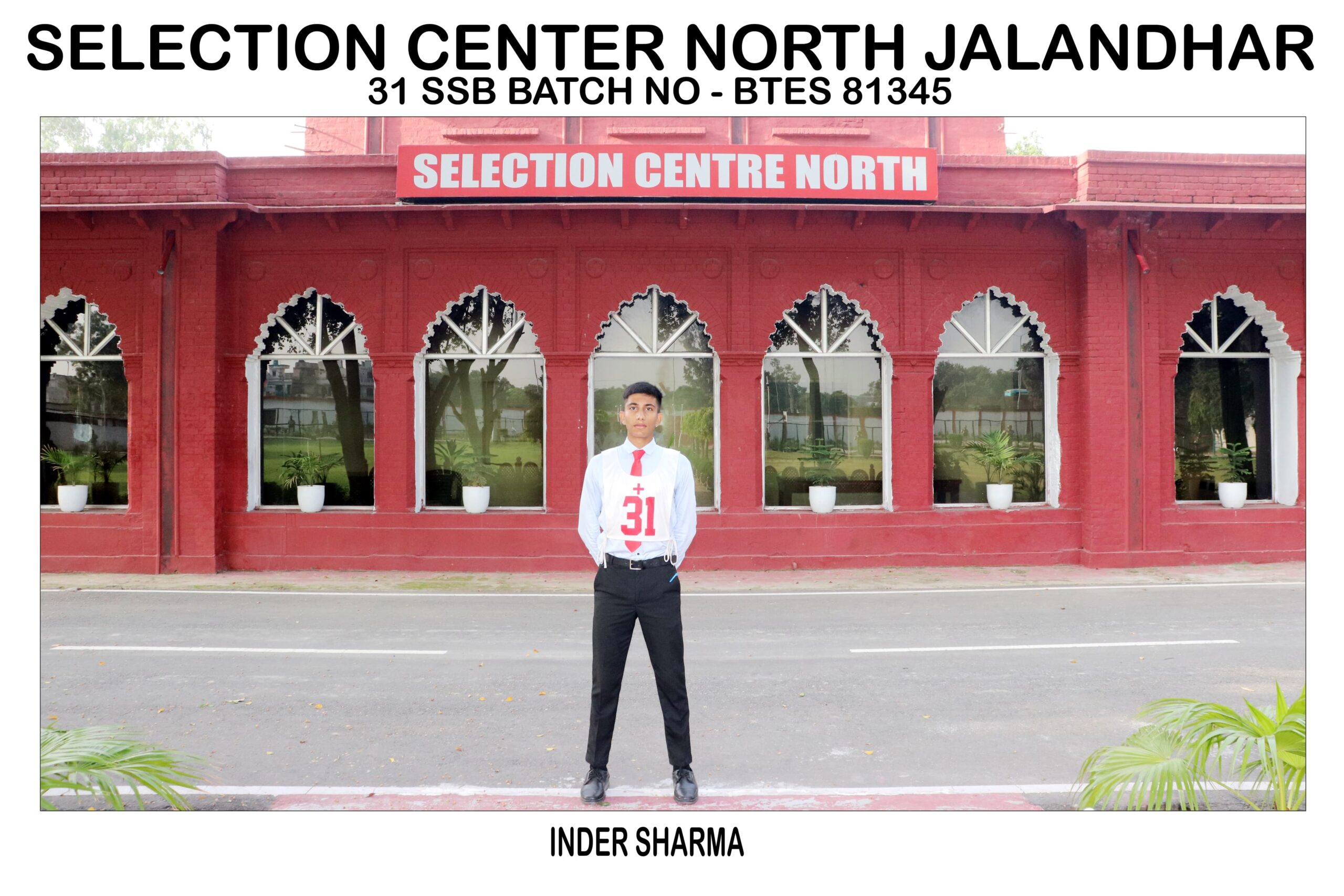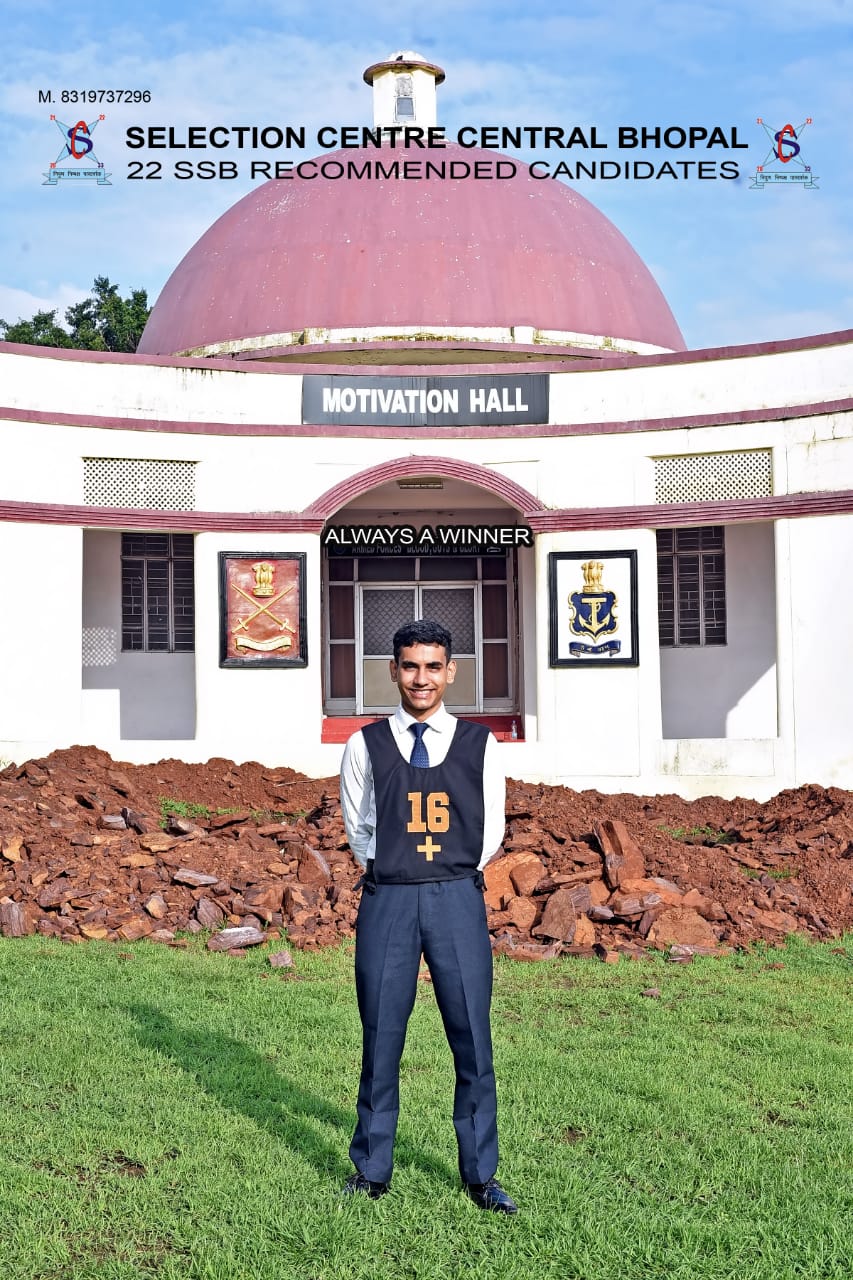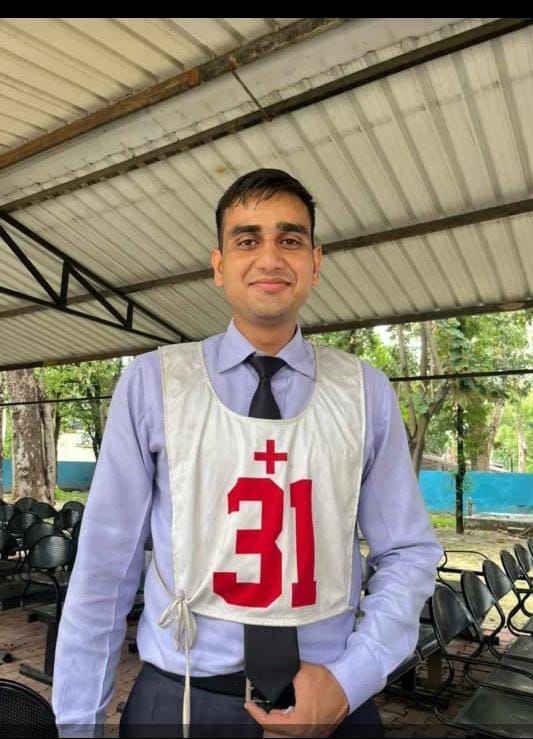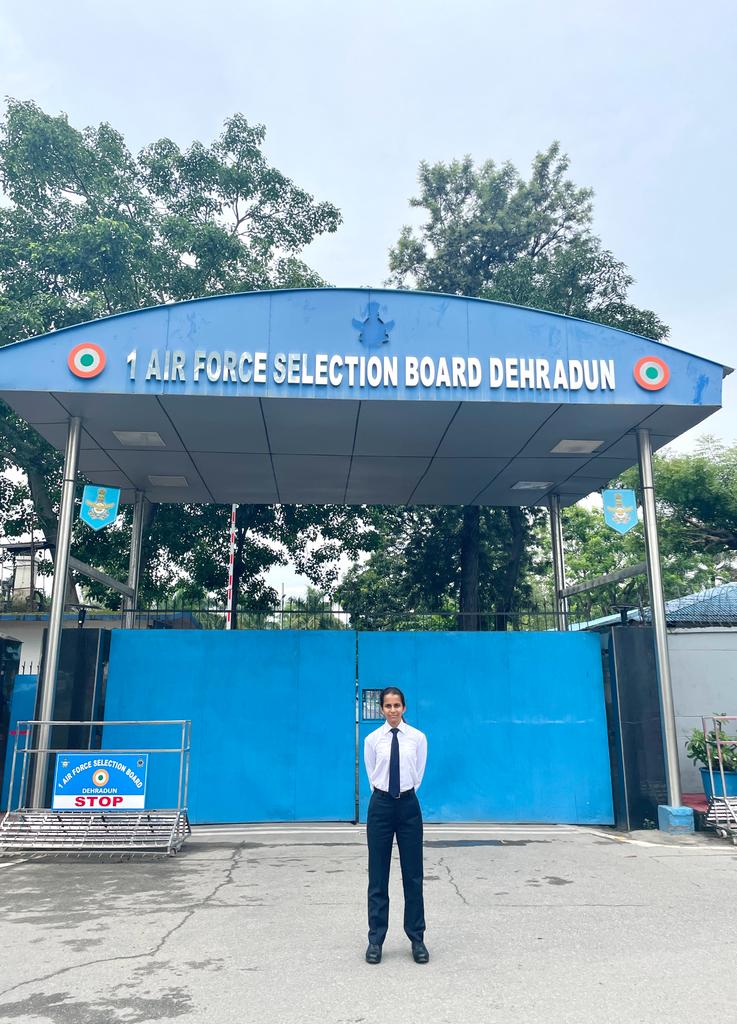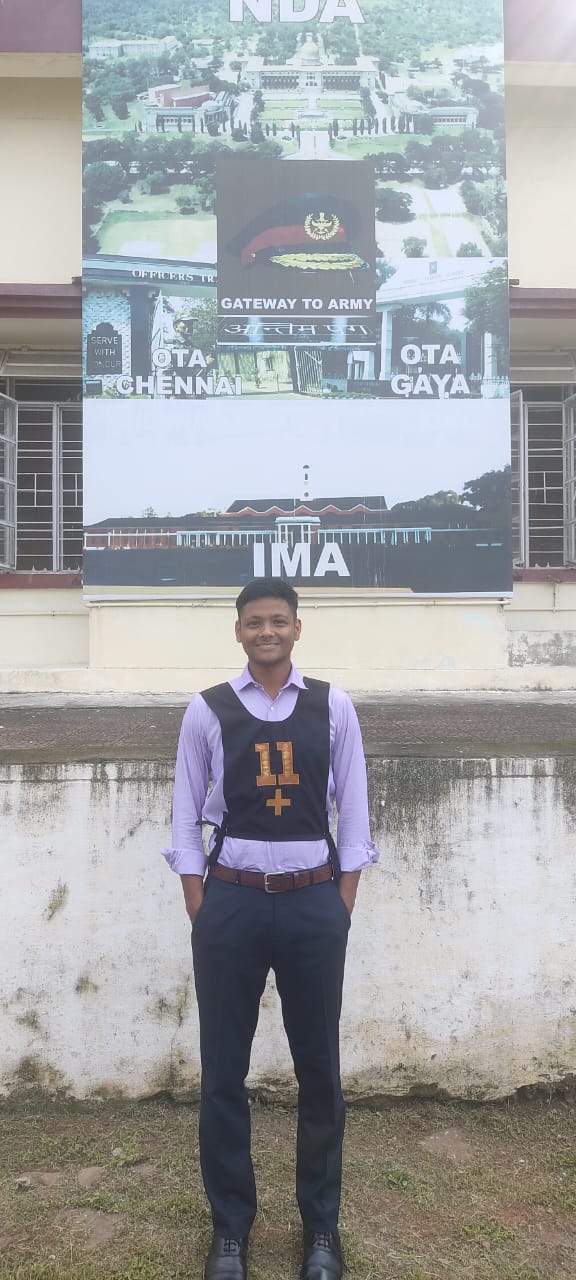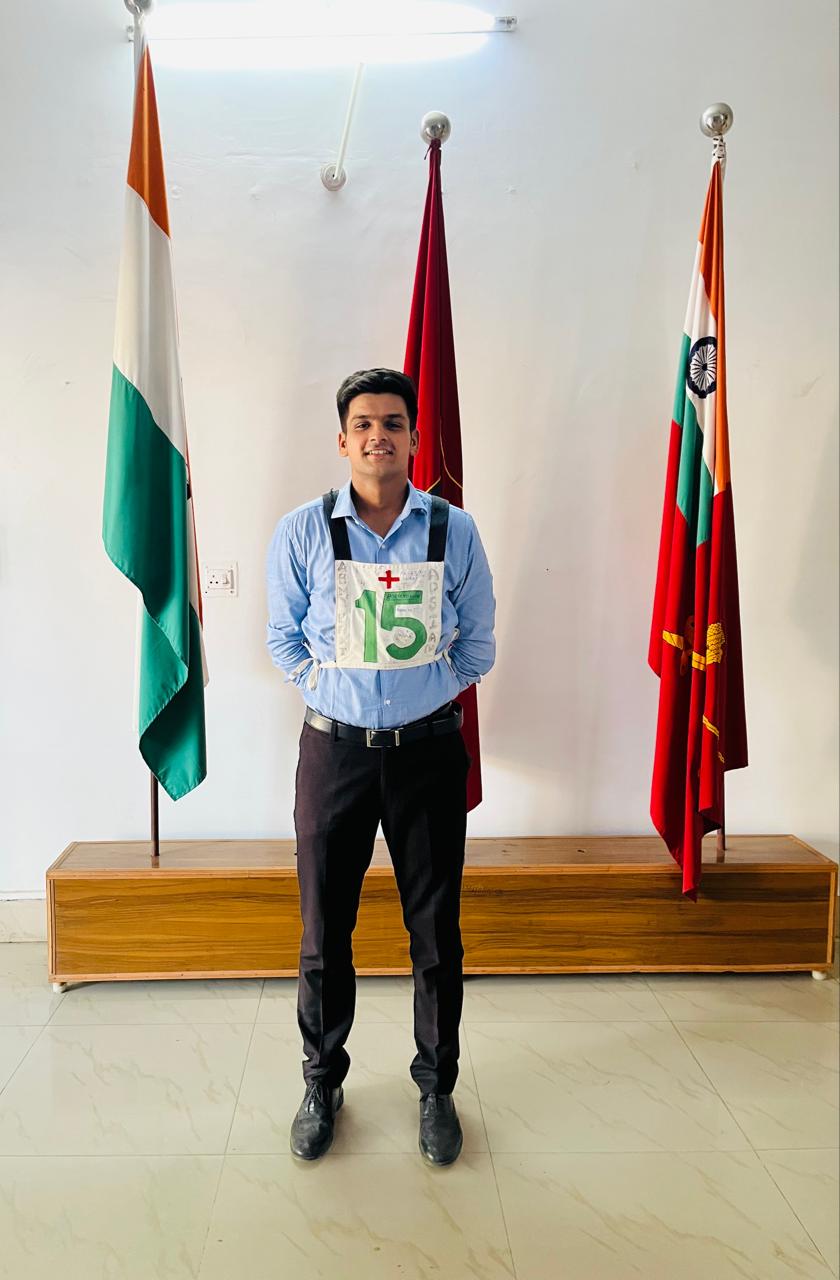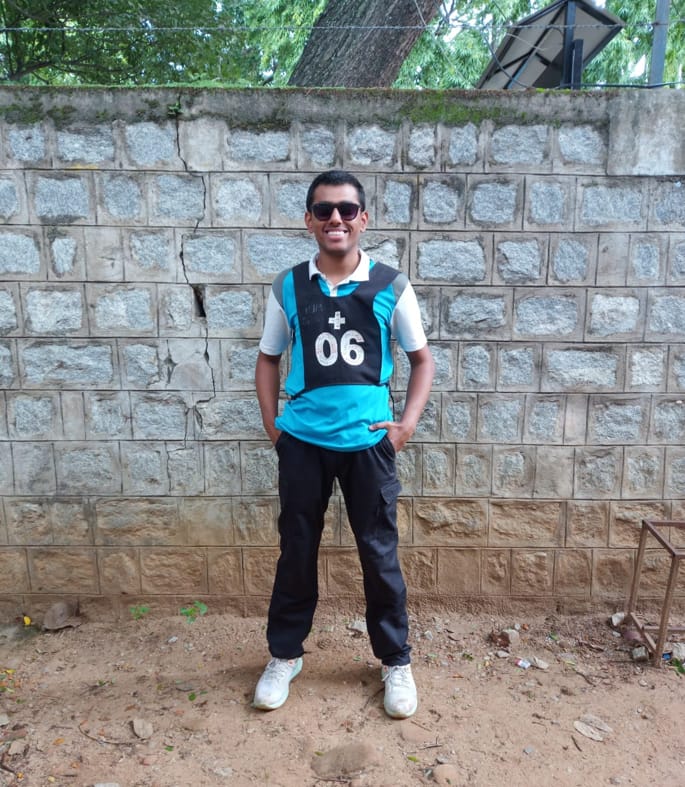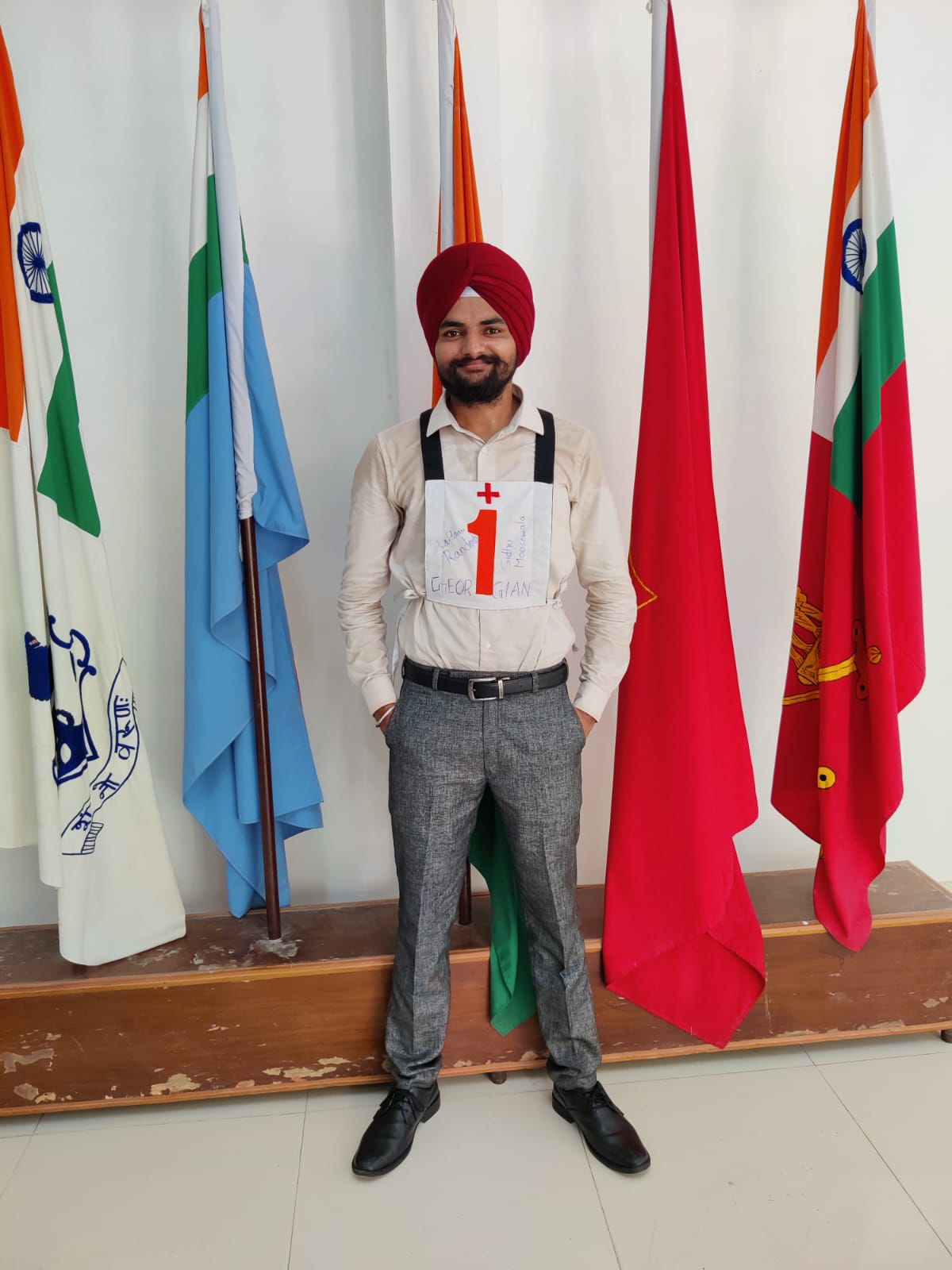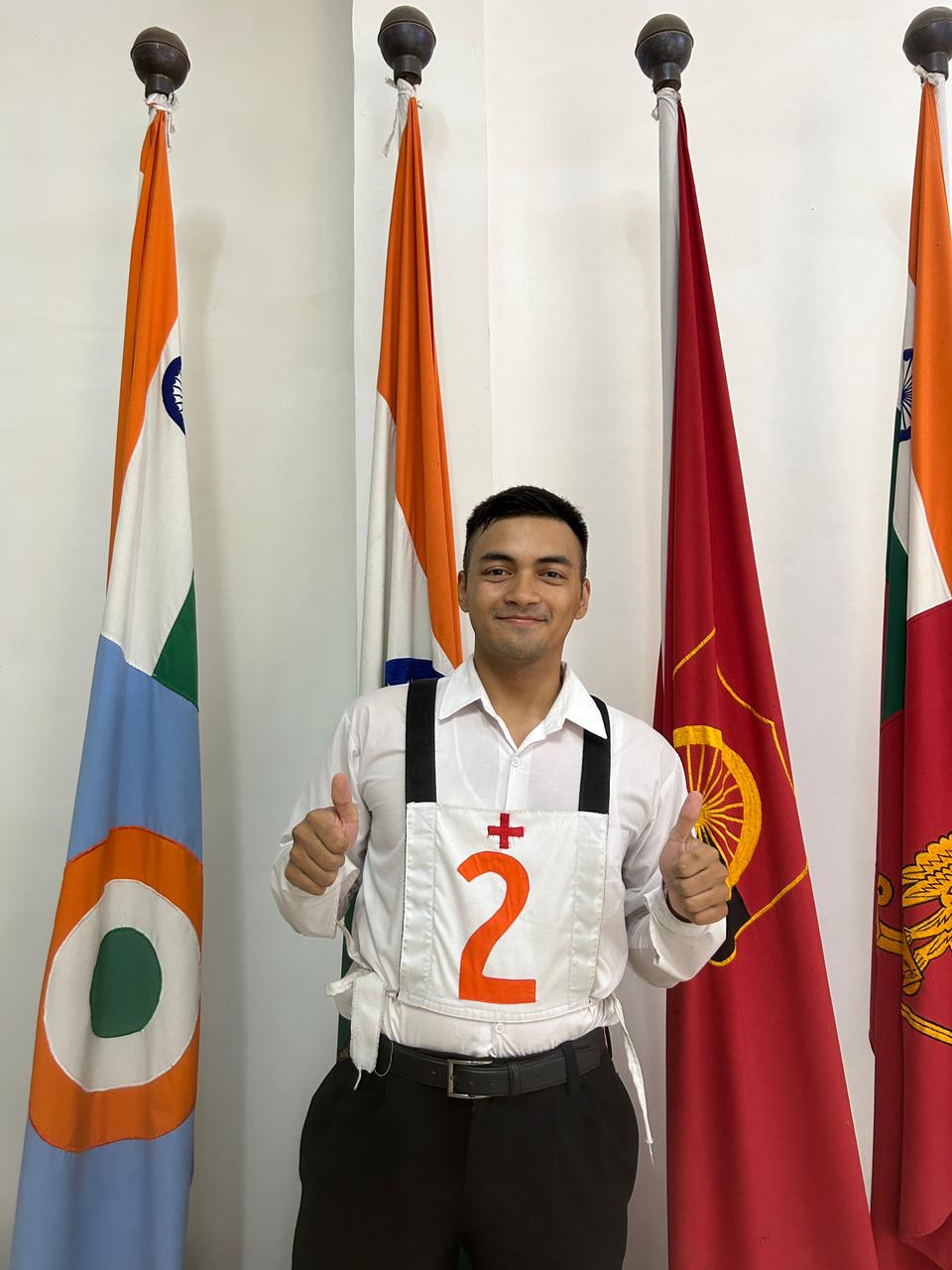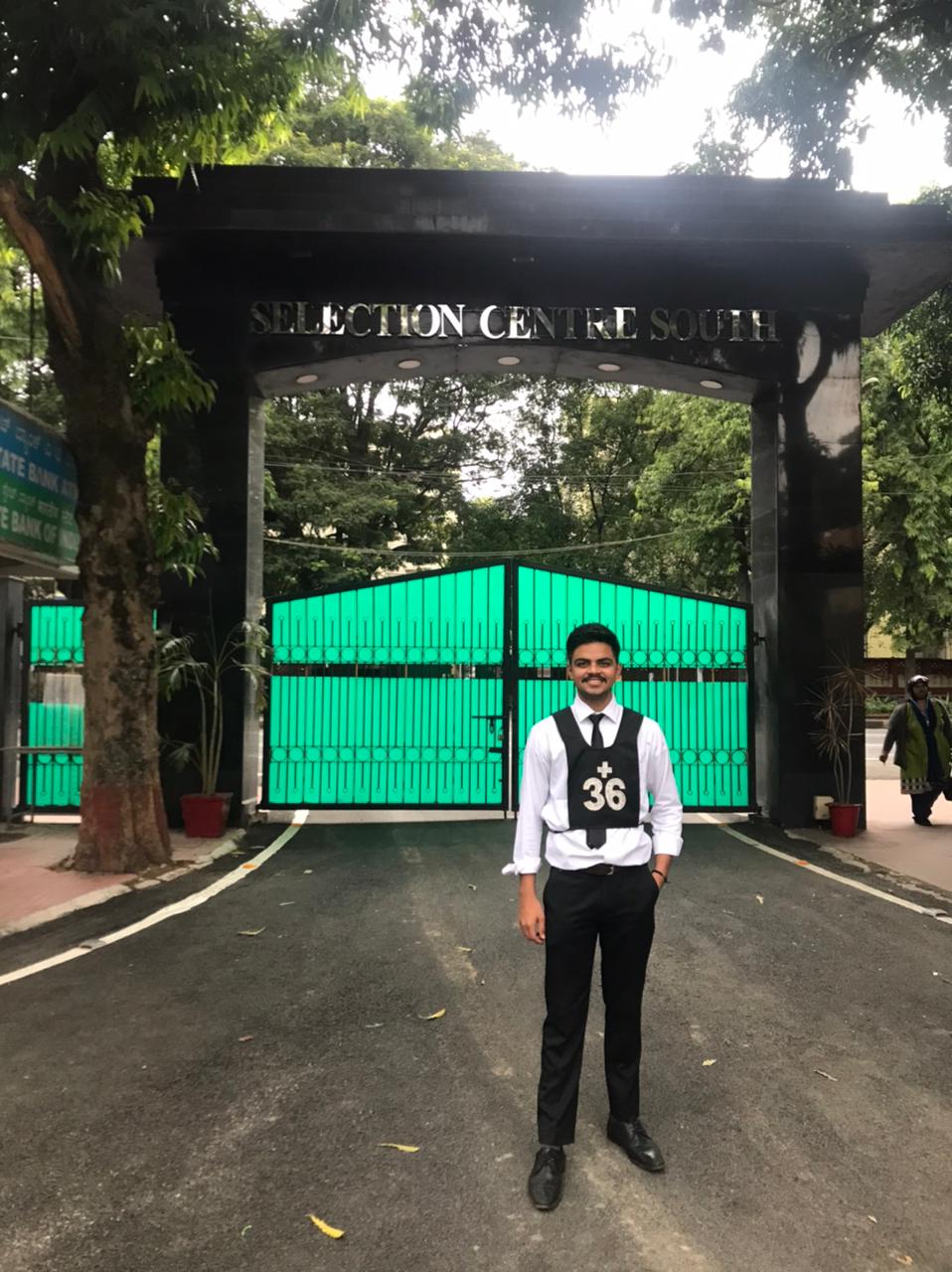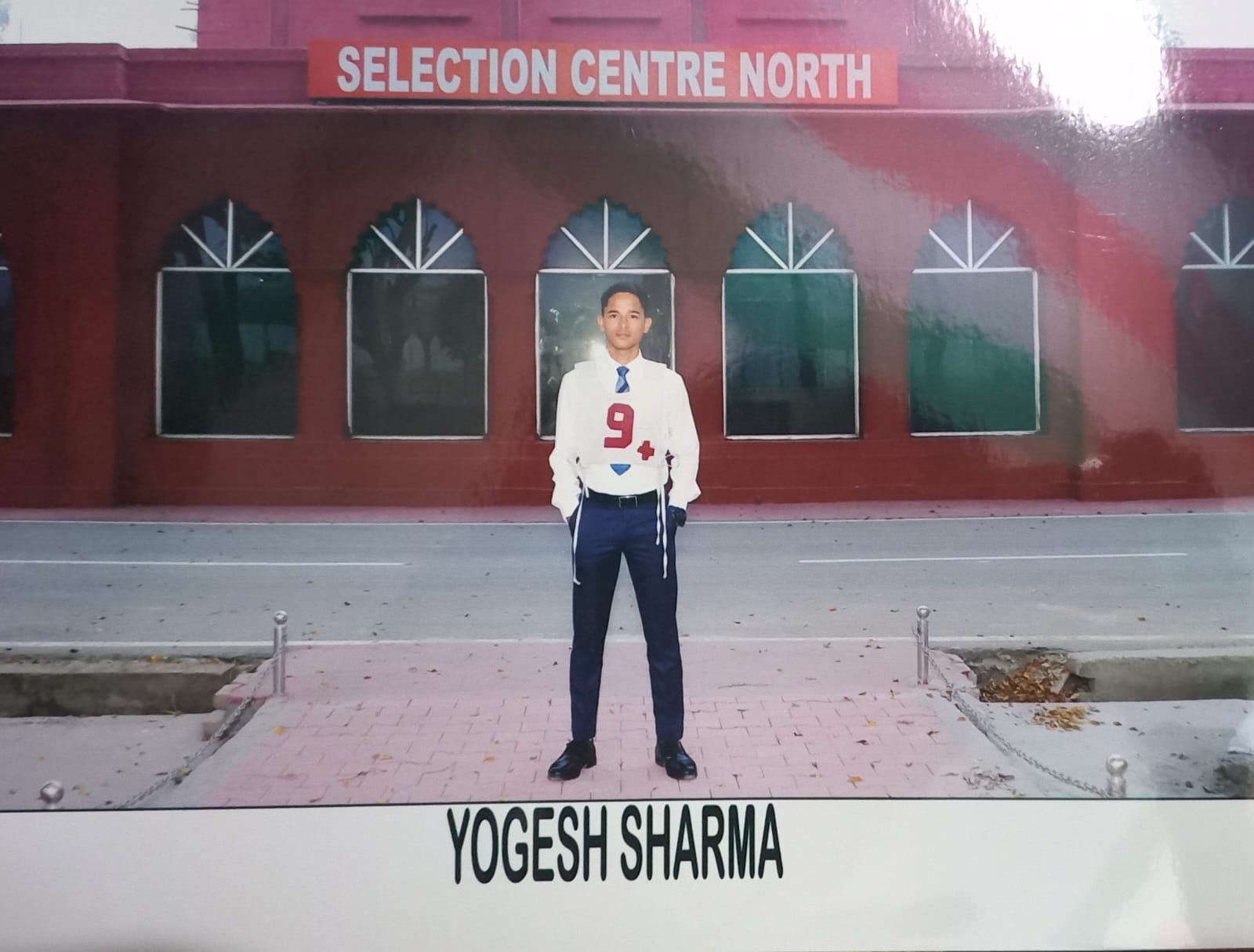SCHEDULE OF COACHING NDA WRITTEN EXAM
60 DAYS & 90 DAYS COURSE – 5 HOURS DAILY OFFLINE AND ONLINE COURSES
SUBJECTS COVERED
A MATHS:
Algebra, Trigonometry, Statistics, Probability, Matrices & Determinants, Analytical Geometry, Differential Calculus, Integral Caculus, Vector Algebra
B ENGLISH:
Comprehension, Error Detection, Sentence Completion, Sentence rearrangement,Idioms and Phrases,Synonyms,Antonyms and Testing of Vocabulary
C GENERAL ABILITY:
History, Geography, Economics, Enviroment, Civics, Defence, Art,Sports, Culture,Current,Affairs,Polity, Physics,Chemistry,Biology etc.
NDA Eligibility
To be eligible for NDA (National Defence Academy), candidates must be between 16.5 to 19.5 years of age, have completed 10+2 or equivalent examinations, and meet physical and medical standards. Stay updated on official notifications and requirements to ensure your eligibility for NDA.
|
Name of the Exam
|
NDA
|
|
Conducting Body
|
Union Public Service Commission
|
|
Exam Level
|
National
|
|
Post
|
Lieutenant
|
|
Gender & Marital Status
|
Unmarried female and male
|
|
NDA Age Limit
|
16.5 to 19.5 years
|
|
NDA Qualification
|
Army Wing: Passed or appearing in Class 12
For Air Force and Naval Wings: Passed or appearing in Class 12. Candidates must have studied Physics, Chemistry and Mathematics in Class 12
|
|
NDA Physical Test
|
In NDA physical test the eligibility of candidates is measured as per height, weight and medical standards
|
|
Selection Process
|
Written exam
SSB Interview
|
NDA Exam Overview
|
Exam name
|
NDA and NA
|
|
NDA full form
|
National Defence Academy and Naval Academy Examination
|
|
Exam Authority
|
UPSC
|
|
Eligibility Conditions
|
Age limit: 16.5 to 19.5 years
Educational Qualification: Class 12
|
|
Application mode
|
Online
|
|
Application fee
|
INR 100 for UR/OBC
|
|
Exam Stages
|
Written test (offline)
SSB interview
|
|
Exam mode
|
Offline
|
|
Number of papers
|
Paper 1: Maths
Paper 2: GAT
|
NDA Exam Pattern
|
Particulars
|
NDA Written exam
|
SSB Interview
|
|
Mode
|
Offline
|
Offline (Group activities and Face to face interview
|
|
Duration
|
5 hours (2 hours 30 minutes for each paper)
|
5 days
|
|
Papers
|
Mathematics
General Ability Test (GAT)
|
Testing
Psychological Test
Group Testing Officers Test
Personal Interview
Conference
|
|
Total marks
|
900
|
900
|
|
Total questions
|
Maths – 120 questions
GAT – 150 questions
|
–
|
NDA Syllabus
In the official notification, the commission mentioned the NDA syllabus for Mathematics and GAT papers. NDA Syllabus is the same for all the candidates irrespective of the services they want to join. NDA exam syllabus consists of all the important topics and chapters from which the questions will be asked in the mathematics and GAT test. Although, the standard questions in the exam are from the 10+2 level.
The Campus at National Defence Academy
The National Defence Academy (NDA) is a tri-service military academy in Pune, India. It is the first of its kind in Asia and the second in the world. The National Defence Academy is a training institute for officers of the Indian Armed Forces.
NDA campus is located on a sprawling area of 18 square kilometres. The academy is situated in the foothills of the Sahyadri Mountain ranges. The campus has a serene and picturesque beauty, which helps in the all-around development of the cadets.
The National Defence Academy has a sanctioned strength of Cadets. The National Defence Academy has a diverse range of cadets from different parts of India and from different walks of life. The National Defence Academy is the Alma Mater of three service chiefs of the Indian Armed Forces and many other senior officers.
SCHEDULE OF COACHING CDS WRITTEN EXAM INCLUDING SSC WOMEN (NON TECHNICAL) COURSE
60 DAYS & 90 DAYS COURSE – 5 HOURS DAILY
OFFLINE AND ONLINE COURSES
CDS Eligibility
CDS Eligibility Criteria
Candidates applying for the CDS exam ensure that they meet the eligibility criteria such as nationality, age limit, marital status, educational qualifications, and physical standards as per the guidelines laid down by the Commission for admission to Combined Defence Services Examination. Verification of eligibility conditions with reference to original documents will be taken up only after the candidate has qualified for SSB Interview/Personality Test.
CDS Nationality
Candidate appearing for CDS exam must be Unmarried and must either be:
(i) a Citizen of India, or
(ii) a subject of Nepal, or
(iii) a person of Indian origin who has migrated from Sri Lanka, Burma, Pakistan, and East African countries of Uganda, Kenya, the United Republic of Tanzania, Zambia, Zaire, Malawi, and Ethiopia or Vietnam with the intention of permanently settling in India.
Candidates in the category (ii) and (iii) shall be required to produce their certificate of eligibility as issued by the Government of India. Certificate of eligibility will, however, not be necessary in the case of candidates who are Gorkha subjects of Nepal.
CDS Age Limit
The CDS age limit along with the cut-off date for age is announced only on the official notification. Check out the table below to know about the school-wise age limit.
|
CDS Schools
|
Age Limit
|
Marital Status
|
|
Indian Military Academy (IMA)
|
19 to 24 years
|
Unmarried male candidates
|
|
Air Force Academy (AFA)
|
20 to 24 years
|
Unmarried male candidates
|
|
Indian Naval Academy (INA)
|
19 to 24 years
|
Unmarried male candidates
|
|
Officers’ Training Academy (OTA) (Men & Women)
|
19 to 25 years
|
Unmarried male candidates
Unmarried women, issueless widows who have not remarried and issueless divorcees (in possession of divorce documents) who have not remarried
|
CDS Educational Qualification
|
Academy
|
Educational Qualification
|
|
Indian Military Academy (IMA)
|
Degree from a recognized university
|
|
Air Force Academy (AFA)
|
Degree of a recognized University (with Physics and Mathematics at 10+2 level) or Bachelor of Engineering
|
|
Indian Naval Academy (INA)
|
Degree in Engineering from a recognized
University/Institution
|
|
Officers’ Training Academy (OTA) (Men & Women)
|
Bachelor’s degree from a recognized university or equivalent
|
CDS Physical Standards
Candidates applying for the Combined Defence Services exam must be free from any disease/syndrome/disability to be deemed medically fit. Candidate should be able to showcase efficient performance during the military duties in any climate, terrain, season, routes including sea, air, remote areas, etc. Candidates should be free from use of any drugs or aid.
Below we have shared the minimum height and weight criteria for meeting CDS Physical Standards:
Army
(i) Body Mass Index should be below 25.
(ii) Minimum height required for male candidates is 157 cm.
(iii) Minimum height required for male candidates is 152 cm.
Navy
(i) Body Mass Index should not be more than 25
(ii) Waist to Hip Ratio should be less than 0.9
(iii) The minimum height requirement is 147 cm
Air Force
(i) Minimum height for Flying Branch is 162.5 cm
(ii) Minimum height for Ground Duty branches is 157.5 cm
(iii) Minimum and Maximum measurements of sitting height, leg length, and thigh length for induction in the Aircrew is as below:
|
Criteria
|
Minimum
|
Maximum
|
|
Sitting Height
|
81.5 cm
|
96 cm
|
|
Leg Length
|
99 cm
|
120 cm
|
|
Thigh Length
|
–
|
64 cm
|
(iv) Body Mass Index should be below 27.
(v) Waist to Hip ratio should be below 0.9 (Males) and 0.8 (Females).
(vi) Waist circumference should be less than 94 cm (Males) and 89 cm (Females).
CDS Selection Process
Candidates go through the CDS Selection Process which includes an online Written Test followed by SSB Interview. Candidates who qualify for both rounds will be considered for the final merit list.
CDS Written Exam
For Admission to Indian Military Academy (IMA), Indian Naval Academy (INA) and Air Force Academy (AFA)
|
Subjects
|
Maximum Marks
|
Duration
|
|
General Knowledge
|
100
|
2 Hours
|
|
English Language
|
100
|
2 Hours
|
|
Elementary Mathematics
|
100
|
2 Hours
|
|
Total
|
300
|
6 hours
|
For Admission to Officers’ Training Academy (OTA)
|
Subjects
|
Maximum Marks
|
Duration
|
|
General Knowledge
|
100
|
2 Hours
|
|
English Language
|
100
|
2 Hours
|
|
Total
|
200
|
2 hours
|
CDS SSB Interview
The candidates who qualify for the CDS written exam will be called to appear in the SSB interview round. The CDS SSB Interview will comprise a two-stage process and only candidates who qualify in the Stage 1 shall be called for Stage 2.
Stage 1
There will be Officer Intelligence Rating (OIR) tests which are Picture Perception* Description Test (PP&DT). Performance in both the OIR and PP&DT tests will be considered for shortlisting for Stage 2.
Stage 2
There will be Interview, Group Testing Officer Tasks, Psychology Tests, and the Conference, usually over a period of 4 days.
SCHEDULE OF COACHING AFCAT WRITTEN EXAM
60 DAYS & 90 DAYS COURSE – 5 HOURS DAILY
OFFLINE AND ONLINE COURSES
SUBJECTS COVERED
1. General Awareness
History, Sports, Geography, Environment, Civics, Basic Science, Defence, Art, Culture, Current Affairs, Politics etc.
2. English
Comprehension, Error Detection, Sentence Completion, Synonyms, Antonyms and Testing of Vocabulary.
3. Maths
Decimal Fraction, Simplification, Average, Profit & loss, Percentage, Ratio & Proportion and Simple interest.
4. Reasoning and Military Aptitude Test
Verbal Skills and Spatial Ability.
AFCAT
India Air Force has announced multiple vacancies to be filled through the AFCAT Exam for the course commencing in every year for Short Service Commission in Flying Branch and Ground Duty (Technical & Non-Technical branches).
AFCAT 2024 Online Application Form
The online registration process for on the official website https://careerindianairforce.cdac.in OR https://afcat.cdac.in.
Steps to Apply for the AFCAT 2024 Exam
Step 1- Registration Process
- Click on the link provided below or visit the official website.
- A new page will appear. New Users will have to register first.
- Click on New User Register.
- A new page will appear to enter your mobile no. and email to register yourself.
- An OTP will be sent to your mobile no. and email, fill and click on “Submit”.
- A Login Id and Password will be sent to your registered mobile no. and email id.
Step 2- Login
- Login using the Registration Number and Password. Select the post.
- Fill up other details such as educational qualifications etc. depending upon the educational qualification of the candidate.
- Pay the examination fee as applicable, online using a Credit/Debit Card or Internet Banking
- Candidates are required to upload their scanned colour photograph and Signature (in English or in Hindi) in JPEG format.
- Login with your Registration Number and Password in the link for “UPLOAD” and thereafter, upload the file/scanned filled
- Upload all the required certificates
- Submit the application. Print out the acknowledgment for records.
AFCAT 1 2024 Eligibility Criteria
AFCAT 1 2024 eligibility criteria for Ground Duty and Flying Branch posts are given below.
(A) AFCAT Age Limit (as on 01/01/2025)
(i) Flying Branch: Applicant age should be at least 20 years and the upper age is capped at 24 years for flying branch. The upper age limit for candidates holding valid and current Commercial Pilot License issued by DGCA (India) is relaxable up to 26 years. The candidates must have been born between 02/01/2001 to 01/01/2005.
(ii)Ground Duty (Technical/Non-Technical) Branches: For ground duty, the minimum age is 20 years and the upper age limit is capped at 26 years. The candidate must have born between 02/01/1999 to 01/01/2005).
Note: Candidates below 25 years of age must be unmarried at the time of commencement of the course. Widows/Widowers and divorcees (with or without encumbrances) below 25 years of age are also not eligible.
(B) AFCAT Educational Qualification
Flying branch: Minimum 50% marks each in physics and mathematics at 10+2 level and a three-year graduation degree OR a BE/BTech degree with a minimum of 60% from a recognized university.
AFCAT 2023 Eligibility Criteria for Ground Duty (Technical)Branch:
(i)Aeronautical engineering (Electronics)(AE(L)): Minimum 60% marks each in physics and mathematics at 10+2 level and a degree in graduation/post-graduation in the field of engineering and technology from a recognized university.
Click Here to Check AFCAT Eligibility Criteria in Details
AFCAT 2024 Selection Process
Indian Air Force will send call letters to all the candidates who clear the AFCAT written paper to appear for the second stage of selection i.e AFSB Testing.
AFSB Testing Stage 1
It includes the following two tests:
- Officer Intelligence Rating Test.
- Picture Perception and Discussion Test (PP&DT)
Stage 1 is called the screening test and candidates who do not clear it will be rejected and will not be called for AFSB Testing Stage 2.
AFSB Testing Stage 2
All Stage 1 qualified candidates will have to appear for AFSB Stage 2 and undergo the following tests:
Psychological Tests: These are written psychological tests and are conducted by professional psychologists.
Group Tests: These tests involve mental and physical activities to examine the candidates on various mental and physical parameters.
AFSB Interview: In this round, the interviewing officer takes a personal round of interviews for the candidate.
Computerized Pilot Selection System (CPSS) Test: This test is mandatory for only those candidates who have applied for the Flying Branch.
Medical Examination
Recommended candidates will be called for the medical examination. The Indian Airforce has prescribed only two centres for Medical Examination which are the Institute of Aviation Medicine, Bengaluru and Air Force Central Medical Establishment (AFCME). After the medical examination, a final merit list would be prepared on the basis of the marks scored by the candidate in written and AFSB interviews. All the shortlisted candidates would be given the joining letter of the respective training academies they have applied to.
AFCAT Exam Pattern
In the Table Below, we have provided you with the exam pattern of the AFCAT Exam.
|
Name of Exam
|
Time Duration
|
Number of Questions
|
Maximum Marks
|
Subjects
|
|
AFCAT
|
2 Hours
|
100
|
300
|
Verbal Ability, Numerical Ability, Reasoning, General Awareness, and Military Aptitude
|
AFCAT Exam
Type of Questions: Multiple-Choice Questions
Time Duration: 2 hrs
No. of questions: 100
Max marks: 300
Subjects: Verbal ability, Numerical Ability, Reasoning, General Awareness and Military Aptitude.
3 marks will be awarded for every correct answer
There is a negative marking of 1 mark in all sections.
AFCAT Syllabus – Overview
The AFCAT written Exam notification contains the latest AFCAT Syllabus and exam pattern, therefore it’s high time for the candidates who are interested in the job profile of multiple posts in Flying and Ground Duty [Technical and Non-Technical]. Check the marking scheme, negative marking, time duration and other details for the AFCAT exam from here.
|
AFCAT Syllabus 2024
|
|
Recruitment Body
|
Indian Air Force (IAF)
|
|
Exam Name
|
Air Force Common Admission Test (AFCAT 2024)
|
|
AFACT 1 Vacancies
|
317
|
|
Category
|
Syllabus
|
|
Exam Level
|
National
|
|
AFCAT Exam Date
|
Feb and August
|
|
Mode of Exam
|
Online
|
|
Time Duration
|
2 hours for AFCAT
|
|
Marking Scheme
|
3 marks for each right answer
|
|
Negative Marking Scheme
|
1 mark for each wrong answer
|
|
Selection Process
|
Written test- AFSB Test- Medical Examination
|
|
Official Website
|
https://afcat.cdac.in/
|
AFCAT Exam Selection Process
The online exam is conducted by the Indian Air Force. The selection process for the AFCAT Exam comprises the following stages:
The AFCAT Written Exam is the only criterion for clearing the first stage for the Non-Technical candidates; while the AFCAT+ EKT (Engineering Knowledge Test) for the Technical candidates
- AFCat/ AFCAT
- Air Force Selection Board (AFSB) Interview
- Medical Test
AFCAT Exam Pattern
The AFCAT exam consists of General Aptitude, General Awareness (GK), Verbal Ability, Reasoning and Military Aptitude. Candidates can check the Exam Pattern of the AFCAT in the table below.
|
Exam
|
AFCAT
|
EKT (only for technical)
|
|
Mode of Exam
|
Online
|
Online
|
|
No. of Questions
|
100
|
50
|
|
Maximum Marks
|
300
|
150
|
|
Duration of Exam
|
2 hours (120 minutes)
|
45 minutes
|
|
Sections in Paper
|
General Awareness, Verbal Ability in English,
Numerical Ability and Reasoning and Military Aptitude Test
|
Mechanical, Computer Science and Electrical & Electronics
|
|
Negative Marking
|
1 mark
|
1 mark
|
For all the candidates of the AFCAT, it is mandatory to appear in the written test. Also, the candidates who have applied for the technical posts. To be accepted for the posts offered by the Indian Air Force through the AFCAT Written Exam, one must score minimum qualifying marks both in the written test and the AFSB test as prescribed by the IAF.
Important Points:
Total Time Duration: 2 hours
Number of Questions: 100
Marking Criteria: +3 for each correct answer
Negative Marking: -1 for each incorrect answer
No marks for unattended questions.
AFCAT Syllabus
Here we are discussing the AFCAT syllabus for all subjects General Awareness, English, Numerical Ability and Reasoning and Military Aptitude Test.
AFCAT Syllabus for General Awareness
This section tests the general knowledge of the candidates. The questions are designed on the basis of ongoing, current events in various fields around the world. About 20 questions are asked in this section.
The major topics covered in this section are given below:
- History
- Sports
- Geography
- Art and Culture
- Current Affairs
- Politics
- Civics
- Environment
- Defense
- Basic Science
AFCAT Syllabus- English
This section tests the proficiency of students in English. The knowledge of language through comprehension is also a part of this section. Total number of questions asked from this section will be about 30.
The important topics for this section are:
- Comprehension
- Basic Grammar
- Fill in the blanks by choosing the appropriate word
- Tenses
- Error Detection
- Sentence Completion
- Synonyms and Antonyms
- Testing of Vocabulary
- One Word Substitution
AFCAT Syllabus- Numerical Ability
This section is to check the knowledge, speed and accuracy of the student in solving numerical problems. Basic Mathematical concepts are covered. The important topics of this section are as follows:
- Decimal and Fraction
- Simple Interest & Compound Interest
- Time & Distance (Trains/Boats & Streams)
- Percentage
- Ratio and Proportion
- Time and Work
- Average
- Profit and Loss
AFCAT Syllabus- Reasoning and Military Aptitude Test
Practice with questions from the topics mentioned below to improve your Reasoning & Aptitude sections
- Odd One Out
- Analogy
- Venn Diagram
- Pattern Completion
- Dot Situation Analysis
- Blood Relation
- Missing Figures
- Figure Classification
- Coding and Decoding
- Spotting the Embedded Figures
- Sequencing
AFCAT Syllabus
The candidates preparing for the Air Force Common Admission Test must begin with their preparation with the latest AFCAT to score good marks in the entrance test.
Syllabus for English Section:
This section of the AFCAT Exam consists of at least 20 questions and the level is from moderate to difficult. Questions would be asked from comprehension, cloze test, synonyms and antonyms, idioms and phrases, and Error spotting.
Syllabus forGeneral Knowledge:
This section consists of questions from Indian History, Polity, Economics, Geography, Physics, Chemistry, Biology andCurrent Affairs. The level of difficulty of this section is from easy to moderate.
Syllabus for Reasoning Section:
Questions would be asked from Series, Venn Diagram, Syllogism, Blood Relation, Non Verbal questions, Verbal reasoning, military aptitude etc.
Syllabus for Quantitative Aptitude Section:
The questions that are asked in the Mathematics sections of AFCAT are of Easy to Moderate level and questions would be asked from Number system, HCF and LCM, Time, Distance and Speed, Time and Work, Ratio and Proportion, Percentage, Average, Simple Interest and Compound Interest, Pipes And Cistern etc.
SCHEDULE OF COACHING ACC WRITTEN Exam
46 DAYS & 60 DAYS COURSE – 5 HOURS DAILY
EXAMINATION DETAILS
About Army Cadet College (ACC) Examination
The Army Cadet College is a defence training facility that trains military personnel for the Indian Army. Another name for the ACC is the Siachin battalion. Army Cadet College Wing (ACC) of the Indian Military Academy trains regular army, navy, and air force soldiers, airmen, and sailors for commission as officers in the Indian Army.
The Army Cadet College Wing, the fifth IMA battalion, is headquartered on Tons Campus and is commanded by a Brigadier rank commander. It is made up of an Academic Department headed by a Principal and three companies, each with three platoons. The latter is broken down into departments under the Humanities & Science Streams, with a Professor or Associate Professor in charge of each department.
The training at IMA is designed to enhance the growth of the moral, intellectual, and physical skills necessary for leadership in the armed services. The IMA cultivates in its trainees the traits of heart and mind, patriotism, dynamism, character, initiative and understanding that are essential for leadership in both war and peace.
The vacancies for ACC exam are announced twice a year and it is required for the soldier training programme. Candidates must have an experience of minimum of two years of service. Other important details of the ACC exam are given in detail in the following table:
|
ACC Exam Recruitment: Highlights
|
|
Name of Exam
|
Army Cadet College
|
|
Exam Conducting Body
|
Military Training Directorate, Indian Army
|
|
Level of Exam
|
National
|
|
Frequency Of Exam
|
Twice a year
|
|
Mode of Application
|
Online
|
|
Selection Process
|
- Phase I- Written Test (Objective Type/MCQ based)
- Phase II- SSB Interview
- Phase III- Medical Test
- Phase IV- Merit List
|
|
Duartion of Phase I
|
One Hour (60 min)
|
|
Duration of Training
|
3 years in ACC Wing & 1 year at IMA
|
|
Training Academy
|
ACC Wing at IMA, Dehradun
|
|
Vacancies Per Course
|
75 (twice a year) or as notified from time to time
|
|
ACC Exam Eligibility
|
Age: 20-27 years
Education: 10+2 Passed or equivalent
|
|
Marital Status
|
Married or Unmarried
|
ACC Exam: Selection Process
There are two stages to the ACC selection process. The first phase is the written exam. An SSB interview and a medical examination are the two parts of the second step. The SSB interview will take place in December/January and July/August. The recommended applicants will next enrol in the Army Cadet College Wing in Dehradun for a three-year programme, followed by one year of pre-commission training at the Indian Military Academy in Dehradun.
SSB Interview Selection Process: The SSB Interview for the ACC Entrance Test is conducted over a 5-days duration. The SSB interview is offered to applicants who successfully complete the written exam. Candidates are put through a series of tests throughout the course of these five days. Stages of the SSB Interview are given below:
|
Day 1 (Stage I)
|
- Intelligence test
- Picture perception & Discussion test
|
|
Day 2 (Stage II)
|
- Psychological test
- Group task
- Personal Interview
|
|
Day 3
|
GTO test
|
|
Day 4
|
Interviews
|
|
Day 5
|
Conference
|
ACC Exam: Eligibility
Eligibility requirements for ACC Entry should be one of the main considerations before submitting the application. Only those applicants who completely meet the ACC eligibility requirements for 2023 will be permitted to apply. Check out the comprehensive eligibility requirements for the ACC exam below:
|
Criteria
|
Eligibility
|
|
Who Can Apply
|
Male or Female
|
|
Nationality
|
Indian
|
|
Educational Qualification
|
10+2 Passed or equivalent (in any stream) Additionally, candidates should have qualified ACC written test.
|
|
Age Limit
|
The age limit for applying to the ACC exam is listed below:
- Minimum number of years: 20
- Maximum number of years: 27
|
|
Marital Status
|
Married Or Unmarried
|
ACC Exam: Exam Pattern
The exam format includes a written test with four papers. Before appearing for the interview, a candidate must pass all three exams. There are 150 objective questions on each paper.
The detailed ACC exam pattern is given below:
|
Paper 1: General Mental Ability
|
|
Subject
|
Maximum marks
|
Number of Questions
|
Exam Duration
|
|
Verbal Reasoning
|
150
|
75
|
1 Hour
|
|
Non-verbal Reasoning
|
30
|
15
|
|
Numerical Ability
|
120
|
60
|
|
Total
|
300
|
150
|
|
Note: Two marks are awarded for every correct answer.
|
|
Paper 2: Current General Awareness
|
|
Type of Questions
|
Multiple Choice Questions (MCQs)
|
|
Number of Questions
|
150 Questions
|
|
Total Marks
|
100 Marks
|
|
Exam Duration
|
1 Hour
|
|
Subjects/ Topics
|
Environment General Awareness, Current affairs, National & International events, Military Awareness
|
|
Paper 3: Interactive Communicative English: This paper is divided into two papers. These two papers are based on interactive and communicative English.
|
|
Paper
|
Maximum marks
|
Number of Questions
|
Duration
|
|
Paper I (Objective type)
It will have each question of 1 mark.
|
120
|
120
|
1 hour
|
|
Paper II (Descriptive test)
It will have each question of 2 marks.
|
180
|
90
|
2 hours
|
|
Paper 4: Interactive Communicative English
|
|
Subject
|
Maximum marks
|
Number of Questions
|
Exam Duration
|
|
Mathematics
|
100
|
50
|
1 Hour
|
|
General Science
|
100
|
50
|
|
Humanities
|
100
|
50
|
|
Total
|
300
|
150
|
It is expected that the ACC Test Pattern will follow previous exam cycle patterns. This section will be updated if the ACC Exam Pattern changes. Candidates can follow the exam cycle from the previous year and then plan their study schedule till the 2023 exam pattern is released.
ACC Exam: Syllabus
The ACC exam pattern is extensive and covers four different Papers. Candidates must learn all subjects to qualify the exam. The ACC Exam Syllabus is expected to be the same as the syllabus from the previous exam cycle. This section will be updated whenever the ACC Exam syllabus is updated. A thoroughly expected syllabus for the ACC Test is provided below:
|
ACC Exam Syllabus
|
|
Subject
|
Detailed Syllabus Topics
|
|
Academic Content test
|
Class 12th level General Science, Mathematics and Humanities.
|
|
Interactive Communicative English
|
- Reading Comprehension
- Article
- Noun & Pronoun
- Direct & indirect speech
- Adjective
- Preposition
- Conjunction & modals
- Active & passive voice
- Synonyms & antonyms
- One-word substitution
- Spot the error
- Cloze test
- Para jumble
- Sentence Improvement
- Sentence jumble
- Verbs
- Tenses
- Types of sentences
- Idioms & Phrases
|
|
Current & General Awareness test
|
- Science & Discoveries
- Indian culture
- Indian Agriculture
- Geography
- Indian Navy and Military
- Religions
- Latest Current affairs
- Famous books and authors
- Sports
- Awards
- Indian constitution
- Indian history
- Indian economy
- Indian politics
|
|
General Mental Ability Test
|
- Deriving Conclusion
- Assertion & Reason
- Punch line
- Situation reaction test
- Cause & effect
- Analytical reasoning
- Syllogism
- Statement & Arguments
- Statement & Conclusion
- Statement & Assumptions
- Statement & Courses of Action
- Mathematical operations
- Arithmetical reasoning
- Number, ranking, and time sequence
- Eligibility test
- Analogy
- Classification
- Series
- Coding-decoding
- Blood relation
- Direction sense
- Logical venn diagrams
- Alphabet test
- Seating arrangements
|
Candidates preparing for the Defence exam can check the links given below to complement their mathematics preparation.
SCHEDULE OF COACHING TA WRITTEN EXAM
60 DAYS & 90 DAYS COURSE – 5 HOURS DAILY
OFFLINE AND ONLINE COURSES
Territorial Army Recruitment: Overview
|
Organization
|
|
Territorial Army
|
|
Post Name
|
|
Territorial Army Officer
|
|
Category
|
|
Govt Jobs
|
|
Job Location
|
|
All India
|
|
Opening Date for Online Application
|
|
October
|
|
Last Date for Online Application
|
|
November
|
|
Schedule of exam
|
|
3rd/ 4th week of Dec
|
|
Age Limit
|
|
16 to 42 Yrs
|
|
Official Website
|
|
www.jointerritorialarmy.gov.in
|
Territorial Army Recruitment Vacancy Details
- Total posts- As per noticfication
Educational Qualification For Territorial Army Officer Posts
- The minimum education qualification for grant of TA commission is a degree from a recognised university and the candidate should be gainfully employed.
- You are advised to check the notification link for details of the educational qualification of the posts.
Territorial Army Recruitment: Fee Details
Candidates’ are required to pay a fee of Rs 500/-
Territorial Army Recruitment: Age Limit
Minimum 16 Years
Maximum 42 Years
Check the notification link for details of the relaxation in age limit.
Selection Process
The selection process will be based on a two- stage selection procedure based on Psychological Aptitude Test and Intelligence Test at Service Selection Boards. All the candidates will be put to stage one test on the first day of reporting at Selection Centres. Candidates who will qualify at stage one will be admitted to the second stage/remaining tests.
The male and female candidates will be placed in separate order of merit on the basis of the total marks secured by them in the online entrance examination and in the SSB tests .
Syllabus of the Examination,
There will be a total 100 numbers of questions having 100 full marks. The exam will consist of following subjects-
- Reasoning
- Elementary Mathematics
- General Knowledge
- English
Territorial Army Recruitment Overview
In Territorial Army Recruitment, officers are required to serve part-time, responding to calls for service for approximately two to three months each year. Civilians can join the territorial army by successfully passing a written test, an interview, and a physical examination. To access all the necessary information regarding Territorial Army recruitment, candidates must carefully go through this entire article.
|
Exam Name
|
Territorial Army Officer Recruitment
|
|
Post
|
Territorial Army Officer (Cyber Warfare)
|
|
Location
|
India
|
|
Exam Mode
|
Online
|
|
Selection Process
|
Written Test & Interview
|
|
Age Limit
|
18 – 42 years
|
|
Educational Qualification
|
Graduation
|
|
Nationality
|
Indian
|
|
Selection Process
|
Written Test, Interview and Medical Examination
|
|
|
|
|
|
|
|
|
|
|
Official Website
|
jointerritorialarmy.gov.in
|
Territorial Army Selection Process
Candidates must familiarize themselves with the selection process for Territorial Army recruitment. The selection procedure for civilians in the Territorial Army consists of the following four phases : –
Phase I: Document Check. Benchmarking of candidates will be done based on qualification for preparation of merit list & issuing call letter for written test.
(ii) Proficiency Test.
Phase II: Written Test (100 Marks). Only candidates scoring 60% and above in objective type written test will qualify for Practical Test.
Phase III: Practical Test (100 Marks). Candidates qualifying in Practical Test will be called for Interview.
Phase IV: Interview (300 Marks). Interview by Board of Officers at Directorate General of Territorial Army.
At the end, Recommended candidates will undergo Medical Examination at Armed Forces Clinic, New Delhi followed by their Police Verification for final selection. Please note that Based on their total marks in the all the phases of Territorial Army Selection Process, Candidates will be placed in separate order of merit.
Rashtriya Military School Admission– Eligibility Criteria
The eligibility criteria of Rashtriya Military School Admission 2024 is as follows.
RMS CET
The details of Rashtriya Military School Common Entrance Test is as follows.
Rashtriya Military School Admission – An Overview
Here are some quick highlights of this exam and admission.
|
Aspects
|
Details
|
|
Name of Exam / Admission
|
RMS CET
|
|
Full Form of RMS CET
|
Rashtriya Military Schools Common Entrance Test
|
|
Exam / Admission Conducting Body
|
RMS
|
|
RMS Full Form
|
Rashtriya Military Schools
|
|
Level of Exam or Admission
|
National
|
|
Type of Exam / Admission
|
School Entrance Exam
|
|
Region
|
Rajasthan, Karnataka, Himachal Pradesh
|
|
Official Website
|
rashtriyamilitaryschools.edu.in
|
Rashtriya Military School Admission– Eligibility Criteria
The eligibility criteria of Rashtriya Military School Admission is as follows.
RMS CET
The details of Rashtriya Military School Common Entrance Test is as follows.
Rashtriya Military School Admission – An Overview
Here are some quick highlights of this exam and admission.
|
Aspects
|
Details
|
|
Name of Exam / Admission
|
RMS CET
|
|
Full Form of RMS CET
|
Rashtriya Military Schools Common Entrance Test
|
|
Exam / Admission Conducting Body
|
RMS
|
|
RMS Full Form
|
Rashtriya Military Schools
|
|
Level of Exam or Admission
|
National
|
|
Type of Exam / Admission
|
School Entrance Exam
|
|
Region
|
Rajasthan, Karnataka, Himachal Pradesh
|
|
Official Website
|
rashtriyamilitaryschools.edu.in
|
RIMC
ADMISSION PROCEDURE
Approximately 25 cadets are admitted every six months. Candidates should not be less than 11½ years of age or must not have attained the age of 13 on 01 (Jan) or 01 (July) of the Term they join in. Admissions are made to Class VIII only. The candidate must be studying in Class VII or have passed Class VII from a recognised school at the time of joining. Application forms are to be submitted to the respective State Governments. Candidates are selected on the basis of their performance in an All India Entrance Examination held twice a year comprising a written examination of question papers in English (125 Marks), Mathematics (200 Marks) and General Knowledge (75 Marks), Successful candidates are called for Viva-Voce test (50 marks).
DESTINATION
The College provides education on the lines of residential Public Schools, principally for boys who desire to join the Defence Forces of India. Those who do not succeed in this aim are well qualified to join a College or professional institution on graduation from the RIMC. However, the College advises only those to apply who are interested in taking up the challenge of serving the Defence Forces of India.
PROSPECTUS
The prospectus-cum-application form and booklet of old question papers can be obtained from the Rashtriya Indian Military College, Garhi Cantt, Dehradun, Uttarakhand Pin Code 248003 through Speed Post by forwarding self addressed slip and an account payee Bank Demand Draft of Rs 600/- for General Candidates Rs 555/- for ST/SC Candidates along with Caste Certificate. The Demand Draft will be made in favour of “THE COMMANDANT RIMC DEHRADUN”, BRANCH SBI TEL BHAWAN, DEHRADUN BANK CODE 01576, UTTARAKHAND . The Address should be typed / written clearly in capital letters with Pin Code and Contact Number. RIMC will not be responsible for any postal delay and loss in transit of prospectus caused by illegible or incomplete address. Alternately, the payment may be made by clicking on the link provided on the main page of the website and the Prospectus shall be sent to the address provided.
Note:
1. The application forms issued only by the RIMC shall be valid. Locally printed/ photocopied and without RIMC hologram(Seal) forms shall not be accepted.
2. No refund of the application fee on any condition will be made.
AGE
The Admission to the College is bi-annual i.e., in January and July each year. Candidates (Boys only) should not be less than 11½ years of age but must not have attained the age of 13 on 01 January or 01 July of the Term they join in.
Note:- The actual dates notified from time to time, by the Government of India, in all the National/leading newspapers will be adhered to.
EDUCATION
Admissions are made to Class I (equivalent to Class VIII) only. The candidates should be studying minimum in Class VII in a recognized school at the time of Admission to the RIMC. They should also be medically fit for entry to the College, in accordance with the medical standards prescribed.
VACANCIES
Generally, one vacancy per State is allotted. However some States with larger population have up to two vacancies allotted.
ENTRANCE EXAMINATION
The Examination comprises of:-
|
A.
|
Written Examination Written Examination The written part of the examination consists of three subjects i.e. English (125 Marks), Mathematics (200 Marks), and General Knowledge (75 Marks). Maths and General knowledge papers may be answered either in Hindi or in English. To qualify, a candidate must obtain a minimum of 50 % marks in each subject.
|
|
B.
|
Viva Voce Viva Voce The oral examination consists of a Viva Voce test of 50 marks, which is designed to assess a candidate’s intelligence, personality and confidence. The minimum passing marks will be 50%.
|
|
C.
|
Medical Examination Medical Examination All the candidates, qualified after interview, will undergo a medical examination at selected Military Hospital and only those candidates found medically fit, will be considered for selection and admission to the RIMC. Medical Examination of the candidates forms only a part of the system of selection and does not guarantee the final selection.
|
SAINIK SCHOOL
Admission process
Admission is based on an entrance test comprising Maths, GK (Sc & Sst), Language and Intelligence for Class VI; Maths, Intelligence, English ,General Science and Social Studies for Class IX, followed by Interview and medical examination.
Sainik Schools admit students in classes VI & IX on the basis of their merit in the Entrance Examination and an Interview and in Class XI students are admitted on the basis of the marks scored in Class X Board examination. Girl candidates are now eligible for admission to Class VI in all Sainik Schools.
Examination subjects & Break down of marks.
Class-VI
|
|
Ser No.
|
Subjects
|
Questions and Marks
|
Marks
|
|
(i)
|
Maths
|
50×3
|
150
|
|
(ii)
|
GK (Sc & Sst)
|
25×2
|
50
|
|
(iii)
|
Language
|
25×2
|
50
|
|
(iv)
|
Intelligence
|
25×2
|
50
|
|
|
|
Total
|
300
|
Class-IX
|
|
Ser No.
|
Subjects
|
Questions and Marks
|
Marks
|
|
(i)
|
Maths
|
50 x 4
|
200
|
|
(ii)
|
Intelligence
|
25 x 2
|
50
|
|
(iii)
|
English
|
25 x 2
|
50
|
|
(iv)
|
General Science
|
25×2
|
50
|
|
(v)
|
Social Studies
|
25×2
|
50
|
|
|
|
Total
|
400
|
Question papers of the earlier exams can be accessed at NTA website
Age limit
Students seeking admission in Class VI should be 10-12 yrs of age as on 31 March in the year admission is being sought.
Students seeking admission for Class IX should be aged 13-15 yrs as on 31 March in the year admission is being sought.
Reservation policy
- 67% of the seats are reserved for candidates domiciled in the State/ UT where the Sainik School is located.
- 33% of the seats are reserved for candidates from Other States and Union Territories (UT).
- Within each Category of Home State/ UT and Other States/ UT quota, seats will be reserved on the following lines:
a) 15% of the seats are reserved for the category Scheduled Caste (SC),
b) 7.5% for the category Scheduled Tribe (ST) and
c) 27% for the category Other Backward Classes belonging to the Non Creamy layer (OBC-NCL) as per the central list.
Thus, 49.50% of the seats in Sainik School are reserved on the above mentioned lines.
Out of the balance 50.50% of the seats in the Home State/ UT and Other States/ UT quota, 25% of the seats are reserved for the wards of defence personnel and ex-servicemen.
In “Other States/ UT” quota, seats will be allotted in each category as per merit, subject to a maximum limit of 25% of vacancies in the category for any State or Union Territory.
In Class VI of each Sainik School, 10% of the total vacancies or 10 seats, whichever is more, are reserved for girls.
Application process
The prospectus and application form are available in the month of October every year and can be obtained from the respective school where the student wants to take admission. The application process is online at https://aissee.nta.nic.in/.
Date of entrance examination : All India Sainik Schools Entrance Examination is held in the month of January every year .
The National Testing Agency (NTA) would be conducting the All-India Sainik Schools Entrance Examination (AISSEE)-2024 on 21 Jan 2024 (Sunday) for admissions to Classes VI and IX in 33 Sainik Schools spread across 23 States and one Union Territory. The Ministry of Defence (MoD) has approved 19 New Sainik Schools, which operate in partnership with NGOs/private schools/State Governments. These approved New Sainik Schools function under the aegis of Sainik Schools Society. Admission to the Sainik School stream of Class VI of the New Sainik Schools, for the academic year 2024-25 is also through AISSEE-2024. The online applications closes on 16 December 2023. Candidates are required to submit their applications after registering on the website https://aissee.nta.nic.in/. A detailed information bulletin is also available on the NTA site- www.nta.ac.in.
Source : Sainik Schools Society
100 Sainik schools in partnership mode
Government of India has decided to set up new Sainik Schools in partnership with Government/ Private Schools /NGOs. The scheme leverages Public/private partnership in education sector, help tap into existing infrastructure available with reputed private and Govt. Schools and open-up new capacities to meet the growing aspirations of children desirous of receiving education in a Sainik School environment.
These schools are approved by Sainik School Society and provide the quality education along with the PLUS Curriculum designed by Sainik School Society, keeping in mind the holistic development of students in these school.
New Sainik Schools offer following benefits to Students:
- The students now have more options and can select the school as suitable to their requirement for example Day School/Residential/Day cum Boarding or Girls Only/Boys Only or Co-Ed School
- With number of schools increasing in every state the proximity to the hometown has increased.
- Academic PLUS curriculum have amalgamation of physical training and value based curriculum
- 50% of the Students up to maximum of 50 will be eligible for scholarship upto 50% with a ceiling of Rs 40000/- on Merit-cum-Means basis.
NCC training in JD/JW wing
- Option to excel in one sport
- Fees for all these school is different and purely governed by school management.
Admission in these newly approved Sainik schools will also take place in the same manner as done for schools approved in first round. At least 40% of seats in the newly approved Sainik schools are to be filled through e-counseling of All India Sainik Schools Entrance Exam (AISSEE) qualified candidates and upto 60% through a test to be conducted by National Testing Agency (NTA) for students already studying in these schools, for which a test namely New Sainik School Entrance Examination 2022 (NSSEE-22) will be conducted by NTA in mid of August.
CAPF
UPSC Eligibility Criteria- CAPF AC Exam
Candidates applying for the CAPF exam should ensure that they fulfil all the CAPF eligibility conditions applicable.
The admission of candidates at all stages is purely provisional subject to satisfying UPSC eligibility criteria for the CAPF exam.
Eligibility conditions are verified with reference to original documents only after the candidate has qualified for the Interview round.
Candidates have to satisfy the following to qualify the CAPF eligibility criteria:
|
UPSC Eligibility criteria for CAPF Assistant Commandant Exam
|
|
Nationality
|
Any Male or Female who is a citizen of India.
|
|
UPSC Age limit for CAPF AC exam
|
Minimum Age is 20 Years;
Maximum Age is 25 years;
|
|
UPSC Age limit relaxation for CAPF AC exam
|
SC/ST: 5 years
OBC(reservation applicable): 3 years
Ex-servicemen/Civil Central Government Servants: 5 Years
J&K Domiciled: 5 years
|
|
Educational Qualification
|
A Bachelor’s degree from any Government recognized University Or Deemed to be University
|
However, the above-mentioned eligibility criteria have certain conditions. You can know the detailed UPSC CAPF eligibility criteria for the Assistant Commandant exam in the link given.
CAPF Syllabus and Exam Pattern
Mere qualifying for the CAPF eligibility does not mean candidates have qualified the exam.
Candidates applying for the UPSC CAPF exam must be thorough with the Assistant Commandant Syllabus and CAPF exam pattern.
The CAPF Assistant Commandant exam will be conducted on
- The written examination to be conducted by UPSC will comprise two Papers in both English and Hindi language.
- Paper-I in CAPF exam will have Multiple Choice Questions carrying 250 marks and Paper-II will be a subjective type holding weightage of 200 marks.
- Post the qualification of paper-I and paper-II candidates will be called for the Physical efficiency test.
- Candidates declared qualified in the PET test will be called for the final Interview round carrying 150 Marks.
- Given below is the time slot for the CAPF Assistant Commandant exam 2023 for the reference of candidates:
- Paper-I – from 10 a.m. to 12 p.m. noon
- Paper-II from 2 p.m. to 5 p.m. evening
|
UPSC CAPF Syllabus and exam pattern is as follows:
|
|
Slots
|
Syllabus
|
Marks
|
|
Paper-I (10am-12pm)
|
General Ability and Intelligence
|
Objective type; 250 marks
|
|
Paper-II (2 pm- 5 pm)
|
General Studies, Essay and Comprehension
|
Subjective type; 200 marks
|
|
Physical Efficiency Test
|
–
|
Candidates who qualify the above two
|
|
Personality test/Interview
|
–
|
150 marks
|
The commission at its discretion will fix the minimum qualifying marks separately for each paper.
Marks of Paper-II will be evaluated only for those candidates who obtain the minimum qualifying marks in Paper-I of CAPF Assistant Commandant Exam..
Candidates can go through the topics-wise syllabus of all the sections covered in the CAPF exam as well as the other government examinations-
CAPF Preparation and Strategy
Now that you are well aware of UPSC CAPF Syllabus for the Assistant Commandant post, here is a breakdown of the Paper-I and Paper-II preparation.
UPSC CAPF preparation tips:
- General Ability and Intelligence paper i.e. Paper-I comprise general mental ability, current events, general science, Indian economy and Polity, Indian History and Geography of India and World.
- For General Ability besides data interpretation candidates have to be thorough with quantitative aptitude, logical reasoning, and numerical ability.
- All the national and international events should be on the fingertips for the current events section.
- Being thorough with the legislative, executive, judiciary system and political system of India will help you clear the Indian polity and economy section easily.
- For Paper-II the essay writing is very important and carry more weightage. Candidates are suggested to increase their language proficiency for essay and comprehension section.
Check out the following links for better preparation:
- Letter Writing Format
- Precis Writing Format
The linked article will abreast you with detailed tips and strategies on UPSC CAPF preparation.
Candidates can go through the Competitive Exam Preparation Strategies for assistance in devising a good study plan and doing diligent preparation.
About CAPF Exam
CAPF full form is Central Armed Police Force. CAPF is the unified name of the seven security forces in India under the authority of the Ministry of Home Affairs.
The Seven Security Forces are as follows:
- CRPF – CRPF full form is Central Reserve Police Force
- BSF– BSF stands for Border Security Force
- ITBP– is known as Indo-Tibetian Border Police Force
- SSB– full form of SSB is Sashastra Seema Bal
- CISF- full form of CISF is Central Industrial Security Forces
- NSG- NSG full form is National Security Guard
- AR- AR stands for Assam Rifles
CAPF is mandated with the responsibility of enabling the Government of India to effectively and efficiently maintain public order, legal rules and regulations, and internal security.
CAPF is also entrusted to preserve the integrity and promote social harmony and development on a national level by placing service and loyalty above self.
UPSC is the body that conducts the CAPF exams to recruit for various Group A and Group B posts in the above-mentioned security services of the country. Given below are notification and result PDFs for previous years:
UPSC CAPF– The shortlisted candidates’ listed roll numbers are included in the result PDF that was made public by the authorities. The merit list only includes the names of candidates who have passed the exam and only those people will receive calls for the following rounds of hiring.
COAST GUARD
Indian Coast Guard Recruitment Highlights
The highlights related to the Indian Coast Guard exam are given below.
|
Exam Particulars
|
Exam Details
|
|
Exam Name
|
Indian Coast Guard Navik exam
|
|
Conducting Body
|
Indian Coast Guard
|
|
Exam Level
|
National level
|
|
Exam Frequency
|
Two times
|
|
Exam Stages
|
Stage-I, II, III & IV
|
|
Mode of Exam
|
Stage I is conducted in Computer Based Mode
|
|
Posts Offered
|
Navik (General Duty & Domestic)
|
|
Exam Fees
|
INR 250 (SC/ST candidates are exempted from payment of application fees)
|
|
Pattern of CBT
|
Section I: Navik (DB)
Section I & II: Navik (GD)
|
|
Exam Duration
|
Section I: 45 mins
Section II: 30 mins
|
|
No. of Papers and Total Marks
|
Section I: 60 (Five papers)
Section II: 50 (Two papers)
|
|
Total Questions
|
Section I: 60
Section II: 50
|
|
Marking Scheme
|
There is no negative marking
|
|
Language/Medium of Exam
|
|
|
|
English
|
Indian Coast Guard Navik Eligibility Criteria
These are the eligibility criteria for Indian Coast Guard Navik:
Age
The age limit for the posts is between 18 and 22 years. Candidates should have been born between May 1, 2002 to April 30, 2006 (Both Dates Inclusive).
Relaxation in the upper age limit of of 5 years (SC/ST) and 3 years (OBC (non-creamy) are provided to candidates.
Educational Qualification
- Navik (General Duty): Passed Class 12 with Maths and Physics from an education board recognized by Council of Boards for School Education (COBSE)
- Navik (Domestic Branch):Passed Class 10 from an education board recognized by Council of Boards for School Education (COBSE).
Indian Coast Guard Selection Process for Navik DB & GD
The selection process for Indian Coast Guard Navik (DB & GD) is divided into the following stages:
Stage-I: This stage will be a written exam that will happen for all posts.
Stage-II: Based on the performance in the Stage- I, candidates will be called for Stage-II that will include Physical Fitness Test (pass/fail), Document verification (pass/fail), Re-assessment of Inconsistent Performers (pass/fail), Initial Medicals Examination.
Stage-III: Based on the performance in Stage-I & Stage-II, an all India merit list will be prepared and e-admit card for Stage-III (final medicals at INS Chilka) will be issued as per the vacancies available and ratio decided by ICG.
Stage-IV: This stage is conducted for candidates who clear Stage III and stand on merit as per vacancies available are provisionally shortlisted for training at INS Chilka.
Indian Coast Guard Exam Centres
Candidates are required to give preferences of five exam cities while filling the application form for Stage I & II exams. Candidates are required to fill first choice within 30 Kms from the present/communication residence. If no examination city is within 30 Km from the current address then the nearest examination city from current address has to be the first choice of the candidate.
Also Read: ICG Navik Exam Centres
Indian Coast Guard Navik Syllabus
The level of the Indian Coast Guard Navik syllabus is of Class 10 and 12 standards. The written exam includes several topics such as English, Mathematics, Physics, Basic Chemistry, Reasoning, Current Affairs and Quantitative Aptitude.
Indian Coast Guard Navik Exam Pattern
The Indian Coast Guard Navik exam pattern is such that it is divided into five stages. The exam pattern for each stage is explained below:
Stage I: In Stage I, there are two sections and it is conducted in computer-based mode. Candidates who have opted for Navik (DB) are required to attempt section I which comprises Maths, Science, English, Reasoning and GK. The standard of the syllabus is of Class 10th level. Maximum marks allotted to the test is 60. Candidates who have opted for Navik (GD) are required to appear for both section I and II. The section I is the same as Navik (DB). Section II comprises questions from Maths and Physics and the marks allotted to the test are 50. The exam is of objective type, questions are asked in MCQs format
Stage II: Those who qualify the written test are asked to appear for Stage II that comprises Physical Fitness Test (PFT), document verification and initial medical exam. The duration of Stage II is for 1 to 2 days. The PFT consists of running, squat ups and push ups. This is qualifying in nature. The pattern of PFT is given below:
- 6 Km run to be completed in 7 minutes
- 20 Squat ups (Uthak Baithak).
- 10 Push-ups
- Candidates should wear comfortable sport rigs during PFT such as shoes, t-shirts, trousers, etc.
In the document verification, all the original documents such as grade X/XII/ Diploma mark sheet/photo Identity card/caste certificate/individual subject and aggregate marks will be verified.
In the initial medical exam, the medical officer may put the candidates as permanently unfit or temporarily unfit. The candidate can appeal on the finding of the initial medical examination within 21 days if permanently unfit or within 42 days if temporarily unfit.
Parameters for Medical Exam
|
Indian Coast Guard Navik Medical Examination Parameters
|
Salient Features
|
|
Height
|
Minimum height has to be 157 cms.
|
|
Chest
|
Well-proportioned chest with minimum expansion of 5 cms.
|
|
Weight
|
Proportionate to height and age + 10 percentage acceptable
|
|
Hearing
|
Normal
|
|
Visual Standard
|
6/6 (Better Eye) and 6/9 (Worse Eye)
(Candidates using glasses are not eligible)
|
|
Tattoo
|
Permanent tattoos on any part of the body are not allowed
|
Stage III: The Stage III comprises final document verification and medical exam at INS Chilka. The duration of this stage is one to two days.
Stage IV: The candidates who clear Stage III and stand in merit as per the vacancies available are provisionally shortlisted for training at INS Chilka.
